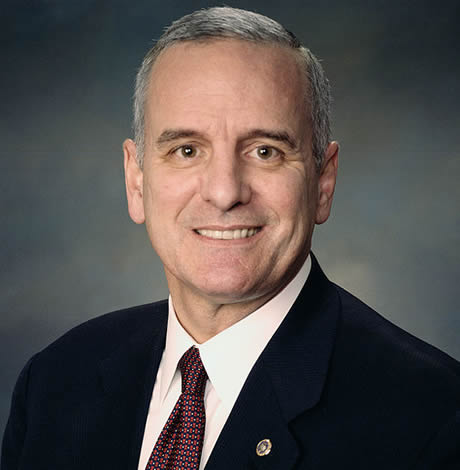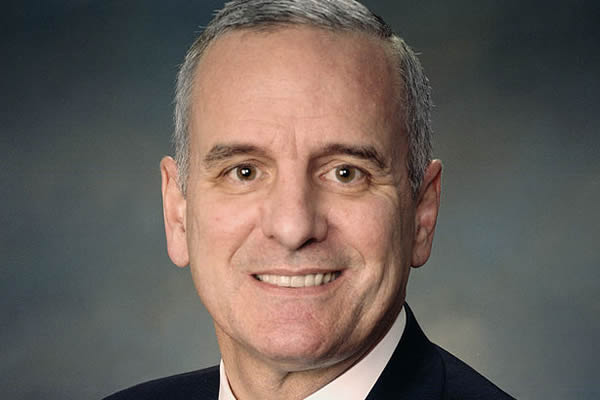National
Minnesota to keep N.C. travel ban as other states demur
Gov. Dayton enacted policy in protest over HB2


Gov. Mark Dayton will keep the travel ban to N.C. (Photo public domain)
Minnesota has become the first state to announce it will retain its travel ban to North Carolina enacted in protest over anti-LGBT bill House Bill 2 despite the governor signing into law a replacement measure.
Gov. Mark Dayton signed the travel ban in April, directing state employees not to travel to North Carolina for nonessential business, after the enactment of HB2 in the state.
Although North Carolina Gov. Roy Cooper, a fellow Democrat, has signed into law a replacement measure he says alleviates the situation, Sam Fettig, a Dayton spokesperson, told the Washington Blade on Wednesday, “No, we are not going to lift the ban.”
Criticized by LGBT rights supporters as a deal that doubles down on discrimination, the agreement between Cooper and Republican leaders in the legislature was reached amid an ongoing economic boycott of state as result of HB2.
The new law, House Bill 142, prohibits municipalities, state agencies and the University of North Carolina from the “regulation of access” to bathrooms, locker rooms and showers without the legislature’s permission. It also bans municipalities from enacting LGBT-inclusive nondiscrimination measures that would apply to private employment or public accommodations until 2020.
Numerous cities that had enacted similar travel bans in protest of HB2 — the District of Columbia, New York City, Oakland, Seattle, San Fransisco, Santa Fe, Salt Lake City and Cincinnati — have declared those bans will remain in place in the aftermath of the deal because of the discriminatory impact of the new law.
But the states haven’t been as forthcoming. At least six — California, Minnesota, New York, Vermont, Connecticut and Washington State — had enacted travel bans to North Carolina as a result of HB2.
A spokesperson for New York Gov. Andrew Cuomo, Rich Azzopardi, stopped short of affirming the ban will remain in place, although he said it remains for the time being.
“Our review of the new North Carolina law is ongoing, and the Governor’s Executive Order currently remains in effect,” Azzopardi said.
In Washington State, the travel ban has actually expired as a result of the new law in North Carolina. The memo that Inslee signed in 2016 states the travel ban would remain in effect “so long as the recently approved HB2 exists in its current form.”
Tara Lee, an Inslee spokesperson, confirmed that as a result of the deal Cooper signed into law “the travel ban no longer applies.”
“However, the governor feels that the changes to their state law are a disappointing half-measure towards the equal protections every person should receive,” Lee said.
In response to a follow-up inquiry on whether Inslee is considering putting a new travel ban in place, Lee replied, “We are considering options.”
California has ban on travel to North Carolina as result of Assembly Bill 1887, a law signed by Gov. Jerry Brown that allows the attorney general to maintain a list of states with laws rolling back LGBT rights and prohibit state-sponsored travel to those states. An official with Attorney General Xavier Becerra’s office said his office is reviewing whether North Carolina no longer warrants inclusion on the travel restriction list after the HB2 deal.
Connecticut Gov. Dan Malloy is also reviewing the new law in North Carolina before making a decision on whether to affirm the travel ban he signed last year, a spokesperson said.
“We don’t have an update, yet,” said Malloy spokesperson Kelly Donnelly. “We are still reviewing the new legislation.”
The offices of Vermont Gov. Phil Scott, a Republican, didn’t respond to a request for comment on the travel ban former Gov. Peter Shumlin, a Democrat, enacted last year.

The Comings & Goings column is about sharing the professional successes of our community. We want to recognize those landing new jobs, new clients for their business, joining boards of organizations and other achievements. Please share your successes with us at [email protected].
Congratulations to Gil Pontes III on his recent appointment to the Financial Advisory Board for the City of Wilton Manors, Fla. Upon being appointed he said, “I’m honored to join the Financial Advisory Board for the City of Wilton Manors at such an important moment for our community. In my role as Executive Director of the NextGen Chamber of Commerce, I spend much of my time focused on economic growth, fiscal sustainability, and the long-term competitiveness of emerging business leaders. I look forward to bringing that perspective to Wilton Manors — helping ensure responsible stewardship of public resources while supporting a vibrant, inclusive local economy.”
Pontes is a nonprofit executive with years of development, operations, budget, management, and strategic planning experience in 501(c)(3), 501(c)(4), and political organizations. Pontes is currently executive director of NextGen, Chamber of Commerce. NextGen Chamber’s mission is to “empower emerging business leaders by generating insights, encouraging engagement, and nurturing leadership development to shape the future economy.” Prior to that he served as managing director of The Nora Project, and director of development also at The Nora Project. He has held a number of other positions including Major Gifts Officer, Thundermist Health Center, and has worked in both real estate and banking including as Business Solutions Adviser, Ironwood Financial. For three years he was a Selectman, Town of Berkley, Mass. In that role, he managed HR and general governance for town government. There were 200+ staff and 6,500 constituents. He balanced a $20,000,000 budget annually, established an Economic Development Committee, and hired the first town administrator.
Pontes earned his bachelor’s degree in political science from the University of Massachusetts, Dartmouth.
Kansas
ACLU sues Kansas over law invalidating trans residents’ IDs
A new Kansas bill requires transgender residents to have their driver’s licenses reflect their sex assigned at birth, invalidating current licenses.

Transgender people across Kansas received letters in the mail on Wednesday demanding the immediate surrender of their driver’s licenses following passage of one of the harshest transgender bathroom bans in the nation. Now the American Civil Liberties Union is filing a lawsuit to block the ban and protect transgender residents from what advocates describe as “sweeping” and “punitive” consequences.
Independent journalist Erin Reed broke the story Wednesday after lawmakers approved House Substitute for Senate Bill 244. In her reporting, Reed included a photo of the letter sent to transgender Kansans, requiring them to obtain a driver’s license that reflects their sex assigned at birth rather than the gender with which they identify.
According to the reporting, transgender Kansans must surrender their driver’s licenses and that their current credentials — regardless of expiration date — will be considered invalid upon the law’s publication. The move effectively nullifies previously issued identification documents, creating immediate uncertainty for those impacted.
House Substitute for Senate Bill 244 also stipulates that any transgender person caught driving without a valid license could face a class B misdemeanor, punishable by up to six months in jail and a $1,000 fine. That potential penalty adds a criminal dimension to what began as an administrative action. It also compounds the legal risks for transgender Kansans, as the state already requires county jails to house inmates according to sex assigned at birth — a policy that advocates say can place transgender detainees at heightened risk.
Beyond identification issues, SB 244 not only bans transgender people from using restrooms that match their gender identity in government buildings — including libraries, courthouses, state parks, hospitals, and interstate rest stops — with the possibility for criminal penalties, but also allows for what critics have described as a “bathroom bounty hunter” provision. The measure permits anyone who encounters a transgender person in a restroom — including potentially in private businesses — to sue them for large sums of money, dramatically expanding the scope of enforcement beyond government authorities.
The lawsuit challenging SB 244 was filed today in the District Court of Douglas County on behalf of anonymous plaintiffs Daniel Doe and Matthew Moe by the American Civil Liberties Union, the ACLU of Kansas, and Ballard Spahr LLP. The complaint argues that SB 244 violates the Kansas Constitution’s protections for personal autonomy, privacy, equality under the law, due process, and freedom of speech.
Additionally, the American Civil Liberties Union filed a temporary restraining order on behalf of the anonymous plaintiffs, arguing that the order — followed by a temporary injunction — is necessary to prevent the “irreparable harm” that would result from SB 244.
State Rep. Abi Boatman, a Wichita Democrat and the only transgender member of the Kansas Legislature, told the Kansas City Star on Wednesday that “persecution is the point.”
“This legislation is a direct attack on the dignity and humanity of transgender Kansans,” said Monica Bennett, legal director of the ACLU of Kansas. “It undermines our state’s strong constitutional protections against government overreach and persecution.”
“SB 244 is a cruel and craven threat to public safety all in the name of fostering fear, division, and paranoia,” said Harper Seldin, senior staff attorney for the ACLU’s LGBTQ & HIV Rights Project. “The invalidation of state-issued IDs threatens to out transgender people against their will every time they apply for a job, rent an apartment, or interact with police. Taken as a whole, SB 244 is a transparent attempt to deny transgender people autonomy over their own identities and push them out of public life altogether.”
“SB 244 presents a state-sanctioned attack on transgender people aimed at silencing, dehumanizing, and alienating Kansans whose gender identity does not conform to the state legislature’s preferences,” said Heather St. Clair, a Ballard Spahr litigator working on the case. “Ballard Spahr is committed to standing with the ACLU and the plaintiffs in fighting on behalf of transgender Kansans for a remedy against the injustices presented by SB 244, and is dedicated to protecting the constitutional rights jeopardized by this new law.”
National
After layoffs at Advocate, parent company acquires ‘Them’ from Conde Nast
Top editorial staff let go last week

Former staff members at the Advocate and Out magazines revealed that parent company Equalpride laid off a number of employees late last week.
Those let go included Advocate editor-in-chief Alex Cooper, Pride.com editor-in-chief Rachel Shatto, brand partnerships manager Erin Manley, community editor Marie-Adélina de la Ferriére, and Out magazine staff writers Moises Mendez and Bernardo Sim, according to a report in Hollywood Reporter.
Cooper, who joined the company in 2021, posted to social media that, “Few people have had the privilege of leading this legendary LGBTQ+ news outlet, and I’m deeply honored to have been one of them. To my team: thank you for the last four years. You’ve been the best. For those also affected today, please let me know how I can support you.”
The Advocate’s PR firm when reached by the Blade said it no longer represents the company. Emails to the Advocate went unanswered.
Equalpride on Friday announced it acquired “Them,” a digital LGBTQ outlet founded in 2017 by Conde Nast.
“Equalpride exists to elevate, celebrate and protect LGBTQ+ storytelling at scale,” Equalpride CEO Mark Berryhill said according to Hollywood Reporter. “By combining the strengths of our brands with this respected digital platform, we’re creating a unified ecosystem that delivers even more impact for our audiences, advertisers, and community partners.”
It’s not clear if “Them” staff would take over editorial responsibilities for the Advocate and Out.



















